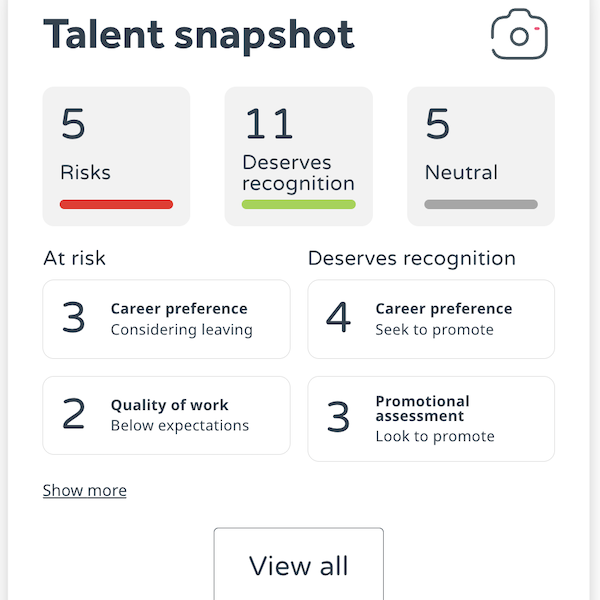At the heart of successful hybrid working is trust. But one in three people don’t trust their employers. And nearly half of employees report feeling distrusted at work, resulting in anxiety and stress, which we know has a significant impact on people’s wellbeing, engagement and productivity.
So, in a hybrid working environment, how can you identify those at risk and take steps to improve performance? There is no magical blueprint for hybrid working success, but cultivating a culture of trust, respect and empowerment is key.
In our recent webinar on this subject, we were joined by one of our longstanding clients, the internationally recognised, David Blackburn, Chief People Officer at the Financial Services Compensation Scheme (FSCS). David shared his thoughts and experiences with us on best practices to make hybrid working a success.
David Blackburn has been working with the FSCS for the past eight and a half years and has won numerous awards for his work in HR. He is listed as one of the top 100 HR directors in the world and is a Chartered Companion of the CIPD.
Quick links
Why high trust cultures deliver improved business performance
How to empower your people and improve performance
Embracing and implementing Smarter Working to unlock success
The acceleration of hybrid
The move towards remote and hybrid working was already in progress long before the pandemic, but not in all businesses, including many companies in the financial services sector. Covid-19 changed that, foisting a new work paradigm upon businesses very quickly.
In some organisations, like the FSCS, the nuts and bolts for remote and hybrid working were already in existence, being implemented as part of an existing plan to offer greater flexibility to employees. For many businesses in the financial sector, however, the move to remote and now hybrid has been a shift to a completely new way of working.
Many organisations won’t be calling staff back to the office permanently. The benefits of remote working have been unlocked and businesses are keen to adapt to hybrid, the new office 9-5. But the forced experiment with remote working has laid bare those companies with poor trust cultures.
HR now have a unique opportunity to reimagine work. It begins with understanding the organisation’s culture.
How to understand the culture of your organisation today

It’s complex. Changing the culture of an organisation doesn’t happen overnight, as David Blackburn explains:
“Our cultural transformation and our work on trust has been five, six years in the making. So, we were in a fortunate position as an organisation when we went into lockdown in March 2020. The organisation was ready to mobilise in that way and was already working flexibly. Our starting point is that every job is fully flexible, and that’s been our view since 2018.
“Ten years ago, nobody was talking about culture, but it has risen up the rankings as one of the challenges that organisation’s CEOs, chief legal officers and executive teams have been worried about. Once culture becomes an issue in an organisation it gets on their radar screen.
“The most common reaction, in my experience, is that the CEO will come to the HR leader and say we need a culture change initiative. I want to be clear – the one thing you don’t need is a culture change initiative, because that isn’t how you make lasting change to the culture of your organisation.
“Our approach at the FSCS was to ask ourselves some really key questions about the lived experience of our employees in the organisation.”
To understand the culture in your organisation, you should first be asking the right questions.
What questions should you be asking?
The first question you should be asking when thinking about the culture of your organisation is “What is it that helps you to get things done? What things are enablers?”
At FSCS, David says, “What we recognised as the biggest enabler was ‘connecting people with purpose.’ Almost everything else in the culture was a blocker.”
David’s top tip for cultural change is to define what you want your culture to be, but to get there, he says, you must understand the culture of your organisation today. Organisations need to develop a clear understanding of their enablers and blockers before they go on that journey.
A key question David asks employees is: “Are you excited about where the organisation is going?”
Five years ago, at the FSCS, 53% of employees said, “Yes, I’m definitely excited”, 22% said, “I’m definitely not excited”, and 25% said, “I have no idea whether I’m excited or not.”
David explains the reason for the disparity as simply because people didn’t understand the organisation’s strategy or destination. “If we say, are you excited about our destination, you have to articulate what that destination is.”
Equally important, David says, is the question: “Do you understand how you personally contribute to the success of this business?”
Even if you have a published strategy, does every single person in your organisation understand their personal connection to that strategic goal? Do they understand what their team is doing, and what they’re doing in that team?
When David first asked this question at the FSCS, the answer was no. Most people said, “even if I’m excited, I’m not sure how I’m personally contributing.”
The FSCS helps people get back on track when financial services firms or those products have failed. That is their enabler. A lot of David’s work at the FSCS over the past five to six years has been to ensure everyone in the organisation is connected to this purpose.
So, what about the blockers? An important question that helps to uncover blockers is: Why is it so difficult to get things done?
David says he used to ask that a lot. “Why is this so hard? I don’t understand why this doesn’t move forward quicker. What’s stopping us?”
The common denominator that links a lot of these factors, David argues, is a low trust culture. Prior to the cultural shift at the FSCS, he explains that: “the vast majority of people thought that they were doing a really good job, individually, but they didn’t really trust anybody else to do a good job, and actually there was quite a passive aggressive blame culture in the organisation.
“There wasn’t a sense that we were all working together to deliver the combined strategic outcome and the biggest issue was that there was a very low trust, not just between individuals, but also low trust between teams and multiple sign off layers of complexity.”
Why high trust cultures deliver improved business performance
Trust is the backbone of all human relationships. But it’s not always so easy to foster in the workplace. The shift to hybrid working has been a challenge for many employers, particularly in financial services which is a highly regulated sector and therefore more fertile to trust issues.
So, what is it about high trust cultures that deliver improved business performance?
David’s go-to for explaining this comes from Stephen Covey’s book, The Speed of Trust.
“Covey says that trust is born out of the character and competence of individuals and organisations. So, trust is there in everything that sits below the line, like integrity and intent, and in the things that sit above the line, such as performance and results – we trust people if they have a track record.
“When we started this conversation at the FSCS way back in 2014, members of the executive thought I was slightly crazy. ‘What are you talking about trust for and why do you think that is so important?’ My response was simple – in low trust cultures, why is it so difficult to get things done? There are multiple sign-offs, layers of hierarchy, and endless approval processes. You can’t make a decision unless you’ve got 44 people in a room! We don’t give people individual accountability.”
A phrase coined by Covey is ‘snoopervising’! In a culture full of snoopervisors, everybody is looking at what everybody else is doing. If you are endlessly writing emails and cc-ing in half the organisation because you want to protect your own back, it means it is slower to get things done, which means the cost of doing it goes up too.
The opposite is true in high trust cultures, where you have efficient and effective controls (different to bureaucracy). Individuals understand their roles and take accountability for it, line managers trust their colleagues to get things done, and measure performance based on outcomes, which means things get done quicker and it reduces the cost.
Financial services is a highly regulated industry, so this isn’t about throwing all the rules out of the window. This is about saying, are the controls appropriate and proportionate? All too often, bureaucracy and low trust get passed off as good governance.
The behaviours that build trust in your relationships and your teams
Building a culture of trust starts with understanding where trust comes from. There are behaviours that we can demonstrate as adults to build trust with each other and to build trust within teams.
Talk straight
- Demonstrate respect
- Create transparency
- Right wrongs
- Show loyalty
- Deliver results
- Get better
- Confront reality
- Clarify expectations
- Practice accountability
- Listen first
- Keep commitments
- Extend trust
How to empower your people and improve performance
Research carried out over the course of the last 18 months includes a study of 8000 employees conducted by one of the world’s leading recruitment firms. While confirming that hybrid working was indeed the way forward, the research found that workers had polarised hybrid working experiences. To future-proof the new normal, it concludes, companies must focus on wellbeing and reconnecting workers, and most importantly acknowledge that ‘one size will not fit all’.
Another study, Work Smarter to Live Better, by Microsoft Surface, analysed in partnership with CIPD, suggests employers should now offer a broader selection of flexible working options.
Employees want to work in a flexible way, but the vast majority in every survey say they don’t want to work permanently from home. Only about 13%, in fact, want this. But 60% of people do want some flexibility, spending some time in the office, and some time at home or in an alternate location.
Employees also don’t want to work nine to five, they want flexibility, not just in location, but within their working day. Employees also want results, outcomes, and the impact of their work to be measured differently, and not judged by the hours that they are sitting at a desk.
Organisations that have seen consistent increases in employee engagement over the course of the pandemic are those that have demonstrated trust.
So, if you’re installing software that is measuring the clicks of your employees on their desktops, you’re doing the wrong thing. That isn’t a way to build trust. Click tracking software takes us back to that kind of overregulation command and control culture which is just not going to work.
David explains, “Trust is the golden thread that runs through all of it. Employees are saying ‘we want to be flexible, we will create flexibility in our day, we want our leaders to care about us and value us as individuals and, in order to do that, they’ve got to trust us.”
To empower people at work, improve business performance and gain trust from employees, employers must give trust first.
Another point David argues as being vitally important in building trust is intent. Say to your employees: “The reason I’m asking you this is … The reason this meeting is happening is for this reason. I want this data for this reason. I’m asking you these questions for this reason.”
The more we are explicit about the intent, the more employees learn to trust – there’s no hidden agenda, which is exactly the case with non-anonymous surveys.
“This is what changed the trust dial at FSCS – being really clear about our intention. Why are we doing this? Why are we sending you a survey? Why are we changing the working patterns? When something is done without a clear reason, people quite often get riled. We find that all the time – when people make it really clear about why they’re asking for feedback and what’s going to happen next, people will fall in line and take part, and share their opinions and give their voice.”
Embracing and implementing Smarter Working to unlock success
Behind a culture of trust and success, there are several working smarter principles. At FSCS this journey has involved targeted attention in 6 key areas:
- The environment: ensuring remote working spaces are set up correctly for productivity and creating collaborative spaces within the office environment.
- Leadership: Recruiting, retaining and training for leadership; facilitating an ‘I can’ approach; tracking outcomes not hours; encouraging accountability; engaging, listening, understanding and acting with the employees ‘whole selves’.
- Learning: a blended learning environment where employees can share their experience, insights and knowledge and progress through career pathways.
- Reward: pay competitive salaries; reward the acquisition and application of knowledge, skills and expertise; enable employees to progress; celebrate success.
- Teams: nurture engagement; empower teams to think creatively and take a fresh look at team rules.
- Technology: optimise technology to support the evolution of a digital business. Examples include cloud-based employee engagement surveys, e-rotas, comms for hybrid meetings, virtual learning, and touchdown facilities.
How WeThrive surveys uncovered individual blockers at FSCS
The FSCS has been working with WeThrive for the last four years to fully understand the engagement, motivations and feelings of the organisation’s people.
Andrew Heath, CEO of WeThrive, explains how the partnership has developed:
“The core of our approach is that we utilise human psychology to really understand how people are feeling about the experience they’re having in the organisation. Our experience in this field means we have been able to develop second stage questions to really get under the skin of why somebody feels the way they do. By increasing understanding, you can then be confident the recommendations you make will have the required impact in terms of changing how people feel about that aspect of work.”
Most of the time, businesses have been doing engagement activity at an organisational level. Some organisations do it at a team level, but WeThrive can do it at an individual level, something that’s quite innovative in this space.
At FSCS, David Blackburn has embraced this approach:
“The surveys we ran from March 2020 through to January of 2021, were revealing. Although the overall engagement levels, and what I would call happiness levels, remained consistently high, the lowest scoring question for most individuals was around their ability to switch off. This allowed us to target our support to those individuals that were struggling. We were able to reach out to them and find ways we could help them. This was absolutely central to our approach to supporting employees during the pandemic.”
This approach wouldn’t have been possible with an anonymous survey. How would you know who to target with an intervention if you don’t know who that person is?
For Andrew, knowing that a number of people in David’s organisation were being cared for and looked after was a validation of the WeThrive approach. Andrew says, “knowing that the insights we have provided genuinely helps individual employees is really what this is all about.”
The FSCS has adopted the individual Employee Bubbles solution, which provides individuals with their own space to survey themselves, get their own action plans, access relevant learning content and track and manage the progress of their personal goals. This means their employees are able to self-diagnose and self-help immediately.
With dispersed workforces this is a valuable tool. Prior to the pandemic, a business might have had a sales team of 20 people sitting on a sales floor in Canary Wharf, but now you might have the same 20 people dotted around the country. You can’t look at them as an amorphous homogenous blob of people where they are more easily engaged because there is a wide spread of sentiment there.
Andrew states that, “from our perspective, how we feel drives everything from how engaged we are, how likely we are to stick around or leave the organisation to how well we are physically and mentally. Our innate needs are universal drivers. We need to look at the employee experience that you’re offering your people, consider if it is meeting needs, and identify where the gaps are.
“When these innate needs are met, then trust is rebuilt.”
So, what are the innate human needs? Hover over each area to learn more.
5 key takeaways
- Smarter working is not a problem that you have to solve
- Working flexibly is a benefit you need to embrace
- You need a high-trust culture to make it happen
- You need the right technology to make it possible
- You need to evolve your approach to performance management to make it a success
WeThrive hosts regular employee engagement webinars covering topics including mental health, wellbeing, employee engagement, neuroscience and many aspects of leadership. Our webinars are packed full of practical hints and tips you can use right away. See what’s coming up or watch on-demand here.



 Talk straight
Talk straight


